10 industry-shattering stolen exclusives
Final Fantasy XIII isn't the first major title to sleep around
What happened? Developer Bungie is closely tied with Microsoft and Halo in the public's mind now, but it wasn't always that way. Before Microsoft bought them in 2000, Bungie was THE developer of Macintosh games, cranking out then-popular titles including Marathon, Pathways into Darkness and the Myth series (and, to a lesser extent, Oni). No other developer seemed more dedicated to the Mac as a gaming platform.
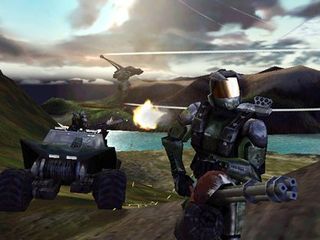
Above: The first official Halo screenshot, taken on a Mac
At the Macworld Expo in 1999, Bungie took the stage during Apple CEO Steve Jobs' keynote speech to introduce an action game it was working on called Halo. What came next was - for the time - nothing short of amazing. Spartans and Covenant Elites clashed in spaceship corridors and huge, open landscapes, freely hopping in and out of vehicles. At a time when the then-unreleased Quake III was considered the pinnacle of action gaming, Halo's promise of wide-open possibility was jaw-dropping. For the first time, Mac gamers had something they could hold over the heads of their PC-owning friends, and it looked incredible.
That was, of course, until Microsoft took notice of it. In 2000, the Redmond giant acquired Bungie, and the hopes of Mac gamers were toast. The game was retooled into a first-person shooter and squirreled away until November 2001, when it was released as an exclusive launch title for Microsoft's Xbox console.
Short-term effects: For many (who'd apparently missed GoldenEye 007 four years earlier), Halo was the first proof that quality first-person shooters could be done on a console. Released in 2001, Halo became the centerpiece of the Xbox's launch, almost single-handedly ensured the system's success at retail and continued to command a high price for years after its release. Predictably, a lot of expectant fans griped loudly, but eventually bought Xboxes anyway.
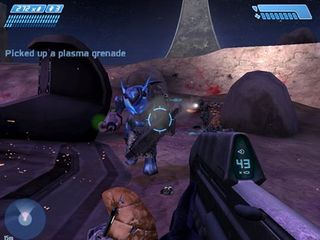
Above: Not quite what we'd been led to expect
Apple, which had recently taken an interest in supporting game development, went back to mostly ignoring the medium, and Mac gamers went back to being treated like second-class citizens by all but a handful of publishers. Eventually, Halo did come to the Mac - but it didn't happen until 2003, and by most accounts it was just OK.
Sign up to the 12DOVE Newsletter
Weekly digests, tales from the communities you love, and more
Long-term effects: What? You all know this story already - especially those of you with the goddamn Master Chief helmets sitting on your shelves. Halo became one of the most popular series in the history of gaming, and helped the Xbox carve out its niche as the system of choice for frat boys and burly-minded shooter fans. Master Chief became the console's - and, to a certain extent, Microsoft's - mascot, and people without Xboxes continue to deride the series as the most banal thing ever.

Stolen from: Consoles
Stolen by: Handhelds
What happened? Dragon Quest is, and has always been, one of the most popular game series in Japan (if not the most popular). And as one of Japan's most popular series, it tends to live on Japan's most popular console. The NES, SNES, PSone and PS2 have all been called home by Dragon Quest games, and all of them topped Japanese sales charts in their heyday. After the series followed the same Nintendo-then-Sony pattern as Final Fantasy, however, it seemed like a sure bet that the next DQ would be a PlayStation 3 exclusive - or at least a Wii exclusive - that would stomp the likes of Blue Dragon and Eternal Sonata.
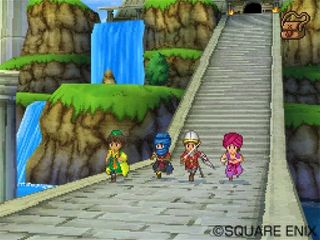
Above: Wait, what?
What we didn't take into account was that roughly eight billion percent of Japan's population owns a Nintendo DS, and that Square Enix's main goal is to get Dragon Quest into the hands of as many people as possible. So it shouldn't have really come as a surprise when - during a December 2006 press conference - publisher Square Enix revealed that Dragon Quest IX would appear exclusively on the two-screen handheld.
Short-term effects: Even in the US, where DQ games enjoy middling popularity at best, the decision to make the next, full-fledged Dragon Quest game would appear on the DS raised some eyebrows. We're used to the idea of spinoffs of console titles showing up on handhelds, but a full-fledged sequel? Shouldn't that be on a "real" console?
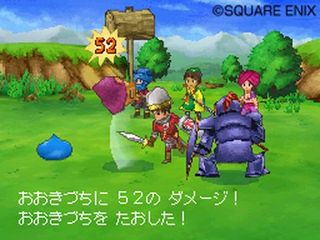
Above: Really?
And that's what Dragon Quest IX has done - it's made us realize that handhelds have advanced to the point where they can be considered direct competitors to bulky, TV-bound machines. They're not toys anymore, they're not peripheral to the experience of playing consoles at home - for millions of people, theyare the consoles. Who needs a bulky, $400 DVD-playing box when you can have a similar experience with a tiny, self-contained portable machine? Not Dragon Quest fans, apparently.
Long-term effects: It's too early to say, because the game isn't actually out in Japan as of this writing. But it's a safe guess that, unless the game turns out lousy, DQ IX will only cement the DS' position as the world's dominant game machine.

Stolen from: Nintendo
Stolen by: Sega
What happened? Street Fighter II's massive arcade popularity turned into a huge boost for Nintendo in July, 1992, when publisher Capcom brought the game exclusively to the SNES. At a time when Sega was gaining ground in the vicious 16-bit console was, Street Fighter II gave Nintendo its first huge hit, selling millions of copies and giving it its first real edge over the Genesis/Mega Drive. A year later, Street Fighter II Turbo arrived on the system, leaving many fans to wonder why the earlier arcade enhancement - Champion Edition - had been passed over entirely.
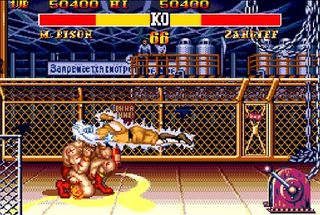
They got their answer two months later, when Street Fighter II: Special Champion Edition came to the Genesis. Essentially identical to Turbo, it packed in a few additional modes and features, as well as introducing Genesis players to the joys of a six-button controller. More significantly, it meant that the advantage the SNES had enjoyed as the only console with Street Fighter II was over.
Short-term effects: Naturally, Nintendo fans were incensed - until they actually played the game, and realized that the fugly graphics and horrible sound (most of the voice samples were fuzzier and more robotic than aSpeak & Spell) made Special Champion Edition a poor cousin to the awesome game they'd been playing. The gameplay was all there, of course, but presentation-wise, it didn't really compare.
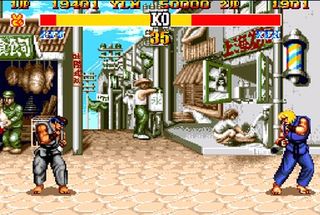
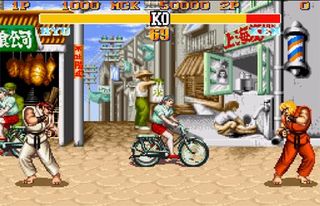
At top: SFII Special Champion Edition on Genesis. At bottom: SFII Turbo on SNES
Even so, Special Champion Edition came out two weeks after the Genesis edition of Mortal Kombat - the one that retained the arcade game's blood and gore, which was censored on the Nintendo release. Those two releases, coming almost back to back, briefly turned Sega's machine into a perceived Mecca for fighting-game fans - at least until Super Street Fighter II came out simultaneously on both systems, and was mostly ignored on the Genesis.
Long-term effects: In the end, Special Champion Edition didn't make much of a difference. According to Capcom's own figures, the game sold just under 1.7 million copies, which sounds impressive until you consider that the SNES SFII and SFII Turbo ended up selling a combined 10.4 million worldwide.

Stolen from: Sega
Stolen by: Microsoft (and Sega)
What happened? Prior to Grand Theft Auto III, Shenmue was one of the biggest, freest, most expensive-looking adventures ever attempted on a console. Following the story of Ryo Hazuki, a young martial artist out to avenge the death of his father in 1980s Japan, the game expertly blended seamless exploration with Virtua Fighter-style karate throwdowns and soon-to-be-standard quicktime events. It almost instantly became the darling of Dreamcast owners in spite of its inane side-quests and goofy dialogue - but for all that love, the game didn't make a whole lot of its money back.
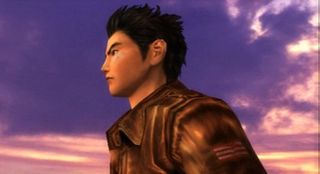
Above: Keep on chasing that sunset, Ryo
Undeterred, its developers at Sega's AM2 studio went to work on a sequel that would be even bigger and prettier than the original. Shenmue II was slated to be released in late 2001, and after the Dreamcast's early demise in March of that year, saddened fans looked to Shenmue II as their console's glorious swan song.
But it never happened that way. In October 2001, shortly after the game's Japanese launch, Sega announced that - while it would be translated and released in Europe - Shenmue II would never see the light of day on American Dreamcasts. Instead, exclusive rights to the game had been snapped up by Microsoft, which would publish Shenmue II as an Xbox exclusive a year later. Effectively, Sega "stole" the game from itself.
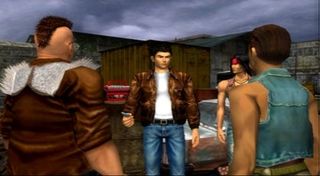
Above: If we have to tussle with thugs, we guess we'd prefer '80s thugs
Short-term effects: By the time October 2002 finally rolled around, few gamers really seemed to care about Shenmue anymore, partly because GTA III and Silent Hill 2 had rewritten the book on free-roaming adventure by that point. Many who did care found themselves frustrated by the game's slow pace, crappy controls and stiff voice acting. By coming out a year later than it was supposed to, a game that might have found a small but enthusiastic audience on the Dreamcast instead sank into Xbox obscurity - ironic, considering that the move to Microsoft's console was meant in part to give the game a bigger audience.
Long-term effects: Six years after Shenmue II's release, Sega still has no plans for a Shenmue III. Ryo's quest for his father's killer will likely never be resolved, and Dreamcast fans will never get the closure they hoped for. Or at least, the ones who still care (and yes, we know you're out there!)won't.

Stolen from: Nintendo
Stolen by: Microsoft
What happened? In the '90s, Nintendo's partnership with Rare was one of the best things ever to happen to the console giant. Rare was responsible for creating some of the biggest and best hits on the SNES and N64, including Donkey Kong Country, Killer Instinct, Banjo-Kazooie, the legendary GoldenEye 007 and the legendarily foul Conker's Bad Fur Day. For a while, many gamers considered the company's games to be second only to those produced by Nintendo's own Shigeru Miyamoto.
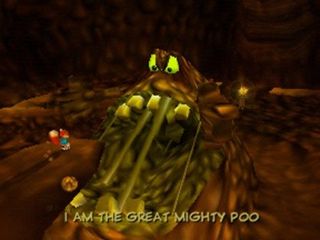
Above: SUCH BRILLIANT MAGNIFICENCE
In 2002, however, Rare made its last major game for a Nintendo console, Star Fox Adventures. Around the time of the game's release, Rare founders Tim and Chris Stamper sold their stake in the company to Microsoft, with Nintendo following soon after. For $377 million, Microsoft bought the goose that had been laying Nintendo's golden eggs - and with it, the franchises and characters that Rare had created for Nintendo.
Short-term effects: Nintendo fans who'd grown to love Rare's games were a little upset, although everyone else at the time seemed distracted by the news that the doomed StarCraft: Ghost wouldn't appear on PCs (which was somewhat less upsetting than its eventual failure to appear on anything).
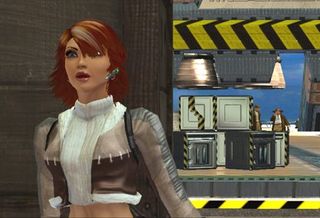
Above: Perfect Dark Meh
However, it quickly started to look as though Microsoft might have gotten a raw deal. Grabbed by the Ghoulies, a 2003 game aimed at kids, was the first game to come out of the Rare-Microsoft partnership - and after its middling scores, industry-watchers began to suspect something was up. Rare's next Xbox effort, Conker: Live and Reloaded, was extremely pretty and featured a kickass multiplayer game, but nevertheless demonstrated just how dated and puerile the original Conker's Bad Fur Day looked in a post-GTA III world.
Then came the Xbox 360 launch and, with it, two games from Rare: Perfect Dark Zero, a prequel to the classic N64 shooter, and a project originally intended for the GameCube: Kameo: Elements of Power. Both were OK at best.
Long-term effects: After Kameo and Perfect Dark, Rare clawed its way back up to respectability with Viva Piñata, which managed to be a mostly excellent game despite the massive promotional blitz and awful cartoon that accompanied it.
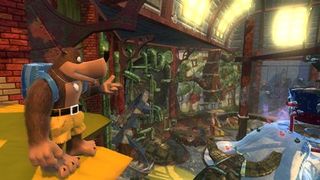
The company is now poised to reinvent the Banjo series with Banjo-Kazooie: Nuts & Bolts, which trades obsessive item-hoarding for the ability to freely build working machines out of whatever junk is lying around. Due out late this year, it's a cool idea, although it's pretty clear that Rare's glory days are over. (Unless they bring out another Battletoads game, that is.)
Hear more about this article inTalkRadar.


Gizmondo 2? Super Nintendo CD? Find out why they vanished before their time

... and 5 reasons why it absolutely will. We dig into the truth behind the rumors and denials
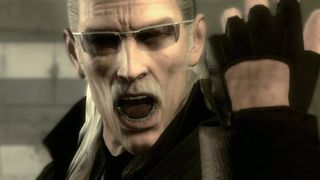
Absolutely nothing

Honestly, they were never that great in the first place

We chronicle the embarrassments that the industry would rather you forgot
Aug 8, 2008
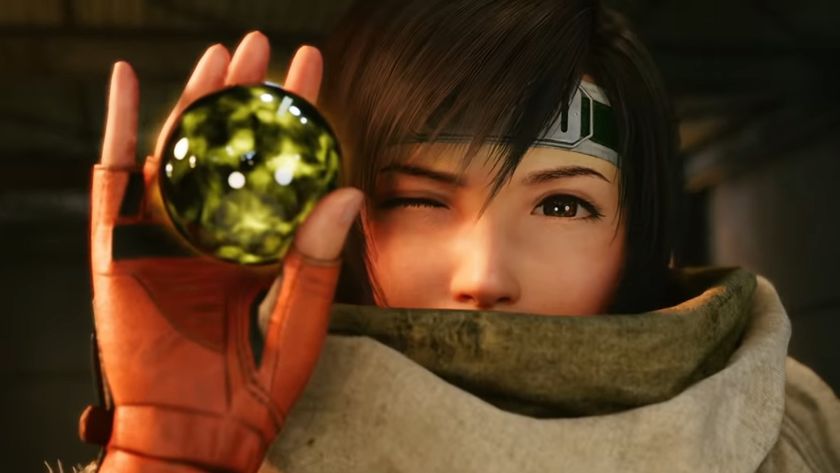
Final Fantasy 7 Remake and Rebirth battle director says combining everything he learned on Monster Hunter: World with Square Enix's technology and unique skills created a "chemical reaction"
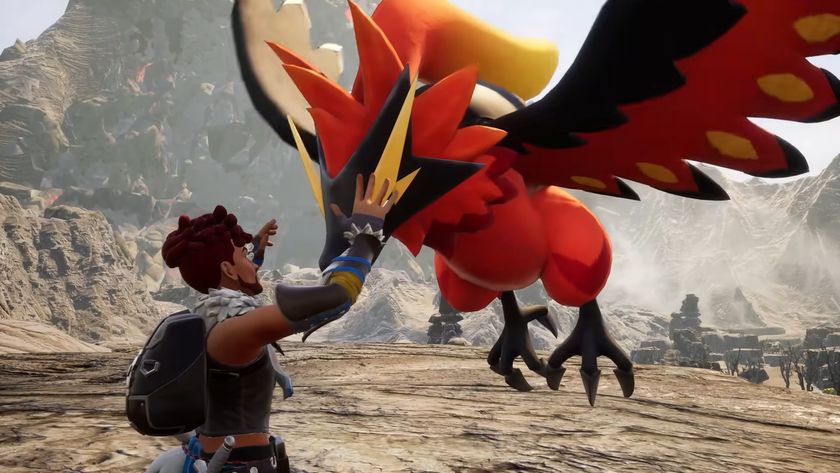
"Minutes after Palworld released," Pocketpair was already getting game pitches from "some really big names" before it even set up its own publisher: "No one has money at the moment"











